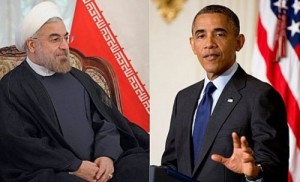 TEHRAN (FNA)- Senior US army commanders in a meeting with President Barack Obama have recommended that he take the opportunity created by the new atmosphere in Iran after the election of President Hassan Rouhani and accelerate talks with Tehran.
TEHRAN (FNA)- Senior US army commanders in a meeting with President Barack Obama have recommended that he take the opportunity created by the new atmosphere in Iran after the election of President Hassan Rouhani and accelerate talks with Tehran."Before President Rouhani's visit to New York (in late September to participate in the UN General Assembly summit) Obama had a consultation meeting with 21 high-ranking US commanders on relations with Iran," sources in Washington told FNA on Saturday.
"At this meeting, most of the senior US army commanders have assessed normalization of ties with the Islamic Republic of Iran as necessary for the US national interests and advised Obama to make rapid advancement in negotiations with Iran," the source added.
Observers believe that the new atmosphere in Iran after the election of President Rouhani followed by the frequent recommendations made by such military figures made the White House initiate a phone contact with the Iranian president when he was about to leave New York for Tehran at the end of his five-day trip.
"Yesterday (Friday) at the moment we were preparing for moving towards the airport (to leave New York after attending the UN General Assembly meeting), the White House contacted us and expressed the willingness of the US president to have a phone conversation for some minutes," Rouhani told reporters at Mehrabad airport after returning Tehran from New York on September 28.
"Our (UN) ambassador's mobile phone was contacted on the way (to the New York airport) and the main topic of our discussion was the nuclear issue," he added.
Rouhani elaborated on the process which led to President Obama's phone talk with him, and said, "The first news on the Americans' willingness for Obama's meeting with me was released at the time we were heading to New York."
He said that there wasn�t enough time to make the necessary arrangements for a meeting between Obama and him in New York.
Iranian Foreign Minister Mohammad Javad Zarif and his US counterpart John Kerry were them commissioned to follow up talks between the two countries.
Iran and the United States also held their highest-level substantive talks in a generation on September 26 on the sidelines of the 68th UN General Assembly meeting, saying the tone was positive but sounding cautious about resolving the long-running standoff over Iran's nuclear program.
Kerry and Zarif met after Zarif held wider talks with the United States and other major powers to address a nuclear standoff between the two sides.
Diplomats from the major countries described the atmosphere of the wider talks in positive terms, but they, as well as the US and Iranian foreign ministers, stressed the difficulty of resolving a dispute that has eluded solution for a decade.
"We had a very constructive meeting," Kerry told reporters after the talks at the United Nations, where he and Zarif had sat next to one another in a gesture that suggested a desire by both sides to explore how to ease their more than three-decade estrangement.
But Kerry added, "Needless to say, one meeting and a change in tone, which was welcome, doesn't answer those questions yet and there is a lot of work to be done."
Zarif also sounded a cautionary note and insisted on quick relief from the painful US, European Union and UN sanctions imposed for Iran's refusal to suspend its uranium enrichment program, a right enshrined in the nuclear Non-Proliferation Treaty (NPT) for all signatories.
"I am satisfied with this first step. Now we have to see whether we can match our positive words with serious deeds so we can move forward," he told reporters.
"Of course as we move forward, there has to be removal of sanctions and in the end game there has to be a total lifting of all sanctions and both bilateral sanctions, unilateral sanctions as well as multilateral sanctions and UN sanctions and we hope to be able to move in that direction within a short span of time."
Kerry said Zarif had put some "possibilities" on the table, but stressed there was more work to be done.
By Fars News Agency�
The Iran Project is not responsible for the content of quoted articles.










